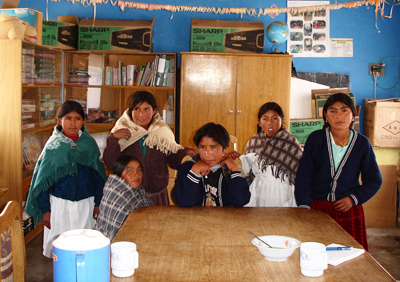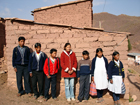Student Lodgings Improve Access to Education
in Bolivian Highlands

Photo: María Elisa Bernal, Social Development Division
A programme of student lodgings in Bolivia has increased schooling in one of the poorest areas in the country by providing one thousand children the chance to go to school.
The programme “Student Lodgings in Family” of the Pueblo Foundation prevents school desertion by opening the doors to education to indigenous boys and girls from rural areas in the Departments of La Paz and Potosí who live far from school.
This programme, which is carried out in conjunction with municipal governments, has already taken in nearly one thousand children. In 2007, it won second place in the Experiences in Social Innovation contest organized by ECLAC with support from the Kellogg Foundation.
In some rural areas of the Bolivian highlands, like in other parts of the region, students must walk up to three hours to get to their schools. These children often drop out because of the many obstacles they must face.
According to the ECLAC report Social Panorama 2009, 54% of Bolivia’s population lives below the poverty line. It is concentrated in rural areas, where 75% of the population is poor.
In Bolivia, 30% of indigenous children interrupt their education during elementary school and must survive with poor reading and writing skills and scant knowledge of mathematics, contributing to the reproduction of the vicious circle of poverty.
In addition to discrimination caused by their place of residence and ethnic origin, children also face gender discrimination. Unlike the trend in other Latin American countries, where girls and female adolescents surpass their male counterparts in terms of access, advancement and achievements in education, in Bolivia, Peru and Guatemala, countries with large indigenous populations, it is the other way around.
“Utawawa” without child labour
The programme “Student Lodgings in Family” resuscitated an ancestral custom, the utawawa”, in Aymara. This custom consists in that families living in remote areas send their children to the homes of relatives or friends who live in villages with schools, where they are lodged in exchange for their help in domestic or farm work.
Child labour is eliminated from the current version “utawawa”, and is replaced with the figure of a “host”: a woman trusted by the parents who takes in their children in exchange for income. This payment, although it is approximately only one dollar a day, in many cases is the family’s main source of income. The host puts them up, takes care of them and provides them with meals. The children attend school and return home during weekends and vacations.
The Pueblo Foundation hires a supervisor who makes sure the pre-established conditions are met: independent rooms for guest students, adequate nutrition and hygiene and payment to women hosts. The Foundation also hires cooks for the school lunch room, creating jobs in the community.
The supervisor also directs a “Play Space” in the afternoons, in which class material is reinforced and children are helped with homework through a school library and a tutor.
Families contribute with toiletries, sheets and school utensils for the personal use of their children, and parents make an annual contribution to pay for a medical kit and other expenses.
The teachers in the schools that participate in the programme receive support in training to improve teaching quality. The programme not only ensures access to education, but also one of better quality for all students in the community.
The programme is highly valued by education officials and teachers. The communities contribute to it with specific actions, like the construction of offices and dining halls and management support.
One of its advantages is its low cost, given that it does not require the construction of boarding homes for students. It also foments social capital by using local capabilities and empowering women hosts, cooks and supervisors.
At the end of the school year, an evaluation workshop is held with the participation of all those involved in the “Student Lodgings in Family” programme. The recommendations resulting from this workshop are taken into account during the implementation of the programme the following year.
Children who calmly go to school
Anette Loscher, education advisor to the Pueblo Foundation, explains that the selection of children for the programme depends on certain criteria: “They have to live at more than an hour and a half walking distance from school. We also give priority to girls, because we live in an area in which only one of every four students is female”.
The family of farmer Daniel Mamami, father of five – four of whom are girls - has benefit from the programme, since they live three hours away from the nearest school.
“My children used to walk, and if it rained they arrived all wet. They suffered with the frost and wind. They would leave home at 7 a.m. and come back late. With this support, they are comfortable, and they practically do not suffer. They go calmly to school,” he says.
His eldest son now studies carpentry with a scholarship in the capital, La Paz, while his two older daughters live with a host family during the school week. The Mamami family hopes to send their two younger daughters to school at Chillca Palca, in the Colquechaca municipality.
*by the Social Development Division
More
IN FOCUS
Measuring Social Spending is More than an Exercise in
Accounting
Priorities Set
for New Plan of Action for the Information
Society
How to Measure Social Cohesion in Latin America?
| A host trusted by the family receives the children in her home, takes care of them and provides them with meals so they can go to school. | |

|
|
| In 2007 the programme won second place in the Experiences in Social Innovation contest organized by ECLAC with support from the Kellogg Foundation. | |